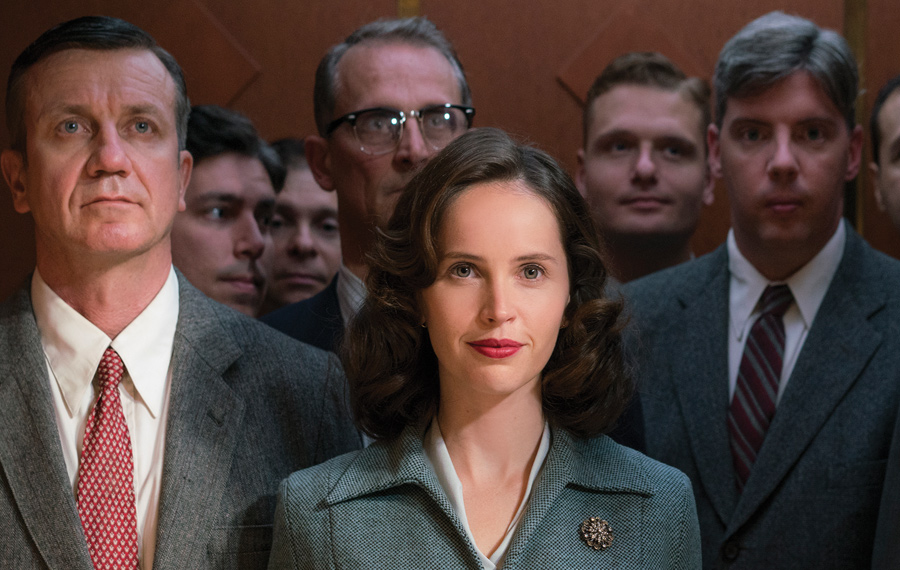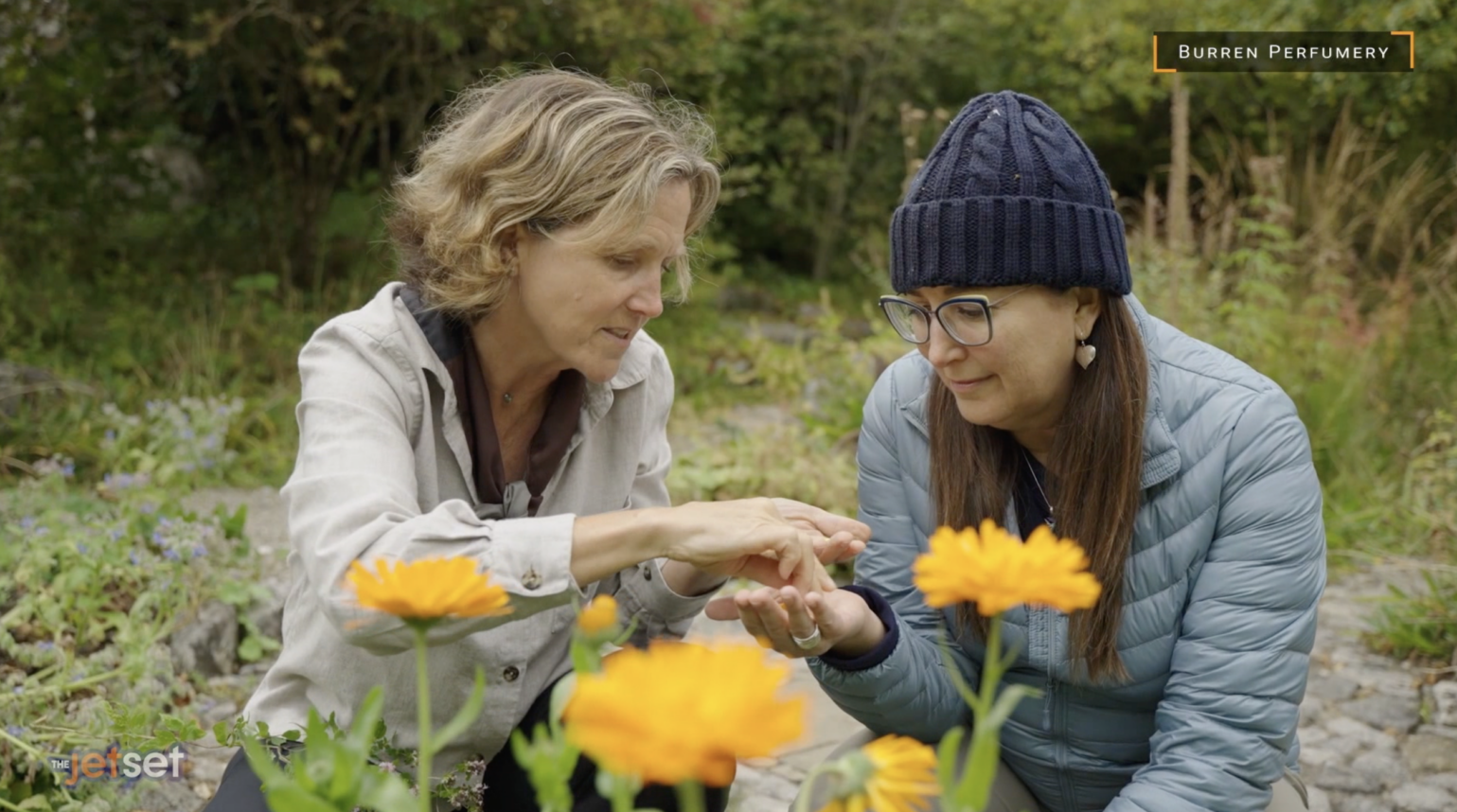
Earlier this year, the lauded documentary “RBG” celebrated the life of Supreme Court Justice Ruth Bader Ginsburg, following the civil rights crusader’s rise to legal powerhouse, pop culture icon and role model for our times. The feature film “On the Basis of Sex” has a narrower focus, zeroing in on Ginsburg’s early career, the early years of her marriage and the landmark case that set her on the path to greatness.
Starring Felicity Jones and Armie Hammer and written by Daniel Stiepleman, the nephew of Ginsburg’s late husband, Martin, the film opens in 1956, when Ginsburg was one of nine women in her law school class at Harvard University. It ends with the landmark gender rights case that the couple argued together in 1970 in which a man caring for his sick mother was denied a caregiver exemption by the IRS because at the time it applied only to women.
The film is directed by Mimi Leder, the Emmy Award-winning director/producer of “ER” and other television shows, including “China Beach” and “The Leftovers.”
“We wanted to tell a great story about this part of [Ginsburg’s] life,” Leder told the Journal. “To me, this movie is about how change happens and about how love prevails. We didn’t set out to make her life story. We wanted to depict this seminal moment where RBG became RBG — where she and her husband fought the only case they ever fought together. It’s a case that affected us all. Discrimination on the basis of sex is not just a women’s issue.”
Leder knew she wanted to be involved in the film as soon as she read the script. “I felt compelled to tell this story because I related to [her] journey on a very personal level,” she said. “Ruth Bader Ginsburg is very much a hero to us all and she has broken the glass ceiling. Although I would never compare my work to Justice Ginsburg’s, I have in my own way broken the glass ceiling for others in my field. I know what it feels like to be one of the only women in the room, if not the only woman in the room.”
Leder also noted that both she and Ginsburg come from Ashkenazi immigrant backgrounds. “We’re both Jewish women, from New York, the mothers of daughters. I’m in a long-term marriage — 32 years — so I know what that’s like,” she said. “I felt as a Jewish woman and a filmmaker I could have some personal insight into telling the story in a very grounded and real way. I felt a personal connection to her and who she was and who she became.” At the outset, Leder said she “didn’t know much about [Ginsburg] on a personal level, but when I started to find out about her I so wanted to tell this story.”
Casting was crucial, Leder said. “Finding that chemistry and the right people to tell the story is always challenging. You never know if it’s going to work until you’re doing it. You hope and pray that it works and in ‘On the Basis of Sex,’ it certainly did.”
Ruth Bader Ginsburg is very much
a hero to us all and she has broken
the glass ceiling.”
— Mimi Leder
Filmed between September and November 2017, mostly in Montreal, the movie wrapped with a scene in Washington, D.C., where Jones, playing Ginsburg, ascends the Supreme Court steps and turns into the real Justice Ginsburg. Leder, who met with Ginsburg several times during the course of filming, was thrilled that the 85-year-old icon agreed to appear. “It’s one of my favorite moments in the movie because it shows how far she came and where she is today,” Leder said.
She notes that the film was underway when the Harvey Weinstein scandal broke and launched the Time’s Up and #MeToo movements, making it more timely and relevant than ever. “The story culminates in the 1970s. It was an era of seismic change in our society. The film is opening on the heels of the 25th anniversary of [Ginsburg’s] tenure on the Supreme Court,” Leder said. ™ “Her journey and remarkable life documents what it meant to be a woman then and what it means to be a woman now.”

Always on Leder’s mind was the responsibility inherent in making a film about a living person, honoring her legacy and pleasing her with the result. “It was daunting, and meeting Justice Ginsburg really added to the pressure to tell the story honestly and honor her,” Leder said. She was worried about what Ginsburg would think of the sex scene, but the justice “was fine with it. She was more concerned that we got the law right.”
Although it doesn’t dwell on the Jewish aspects of Ginsburg’s life, “On the Basis of Sex” does establish that she is Jewish, with several references to it and a visible menorah in one scene. Leder had visited the justice’s apartment and made note of the menorah and Jewish art on display. “It was very subtle,” Leder said. “But we certainly played her as a Jewish woman in her heart and soul.”
Leder grew up in a non-observant home, the daughter of a Belgian-born Holocaust survivor mother who survived four concentration camps and a death march. Her father, a U.S. Army medic, helped liberate Buchenwald after World War II. Her parents met in New York, married and moved to Los Angeles when Leder was 6.
“My parents were very Jewish culturally,” she said, describing her late father as an atheist and mother, now almost 96, as agnostic, “but they both were very proud to be Jewish. I feel a great connection to my Jewishness, my heritage. It’s just part of who I am. I bring that with me.”
Leder’s father was a producer, her brother became a screenwriter and her sister is a casting director, now at Paramount Television. “I grew up in Hollywood, on a set, making low-budget films with my father. My whole family was a part of that,” she said. “It was an incredible life. I cherish every moment.”
Her showbiz family has expanded to include her husband, Gary Werntz, an actor-writer whose credits include many of her projects and who appears in “On the Basis of Sex” as Judge Doyle; and her daughter, Hannah, an actor-writer-director. “She’s very much following in my footsteps,” Leder said.
“I feel that I have paved the way for young filmmakers to tell their stories and not be afraid.”
— Mimi Leder
When she was 20, Leder became the first woman accepted by the American Film Institute’s cinematography program, honing a skill that prepared her to direct. “I cut my teeth learning how to work with a camera, to understand how you tell a story visually,” she said.
She made her directorial debut with an episode of “L.A. Law” in 1987 and soon established herself as a master of high-end drama with shows like “Sisters” and “China Beach.” She made her feature directing debut with the action film “The Peacemaker” in 1997 followed by “Deep Impact” the following year. But after 2000’s underperforming “Pay It Forward,” Leder said, “No one would hire me to make a film. But I flourished in TV.”
Her latest television project as a producer and director is an untitled series set behind the scenes of a morning news show, starring Jennifer Aniston, Reese Witherspoon and Steve Carell. “It very much deals with the country today, and greed and powerful women,” Leder said of the show, set to debut next summer on Apple TV. “I would call it a drama with a lot of dark comedy. It’s a hard tone to hit and we’re having a great time doing it.”
On Leder’s future slate is a movie she’s written about growing up in her filmmaking family and a film about “the women of early Hollywood, like Mary Pickford and Frances Marion, who wrote, directed and edited films. Then when it became a business, it became a man’s business,” she said.

She’s thrilled that the number of female directors is on the rise today. “But we need more. We still don’t have gender parity,” she said, noting that she has mentored several young women who have become directors. “We need more diversity, more inclusion, more equality, more safety in the workplace. We have so much work to do. I feel that I have paved the way for young filmmakers to tell their stories and not be afraid.”
Reflecting on her career, Leder singles out “The Leftovers” and “On the Basis of Sex” as highlights. “Having had the privilege of telling the story of Ruth Bader Ginsburg is one of the great all-time experiences of my career,” she said. “It was very important to me to be part of this and help tell the story of a remarkable woman of our time who changed the world.”
Leder hopes audiences are inspired by the film. “I want people to walk away and feel like they can do anything, that they can find the strength inside them to speak their voice and make a change,” she said. “I want people to be grateful for Justice Ginsburg’s legacy, for what she did for all of us and for the world, for equality and justice. What she did was not only find a seat at the table, she found a seat at the bench. I think all of us can find a seat at the table with our voices.”
“On the Basis of Sex” opens in theaters on Dec. 25.
Read more from the 2018 Holiday Arts & Entertainment Edition here.






















